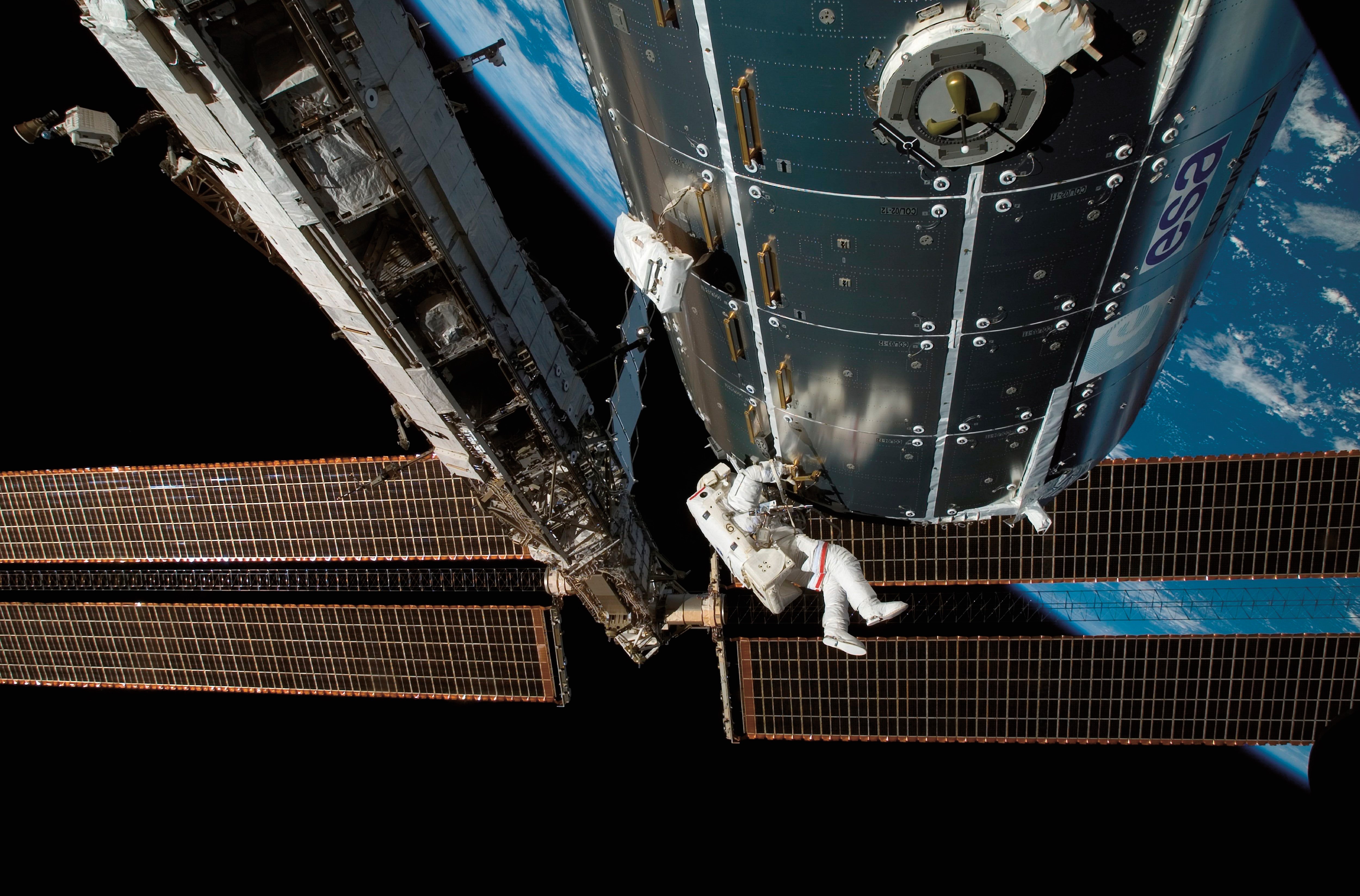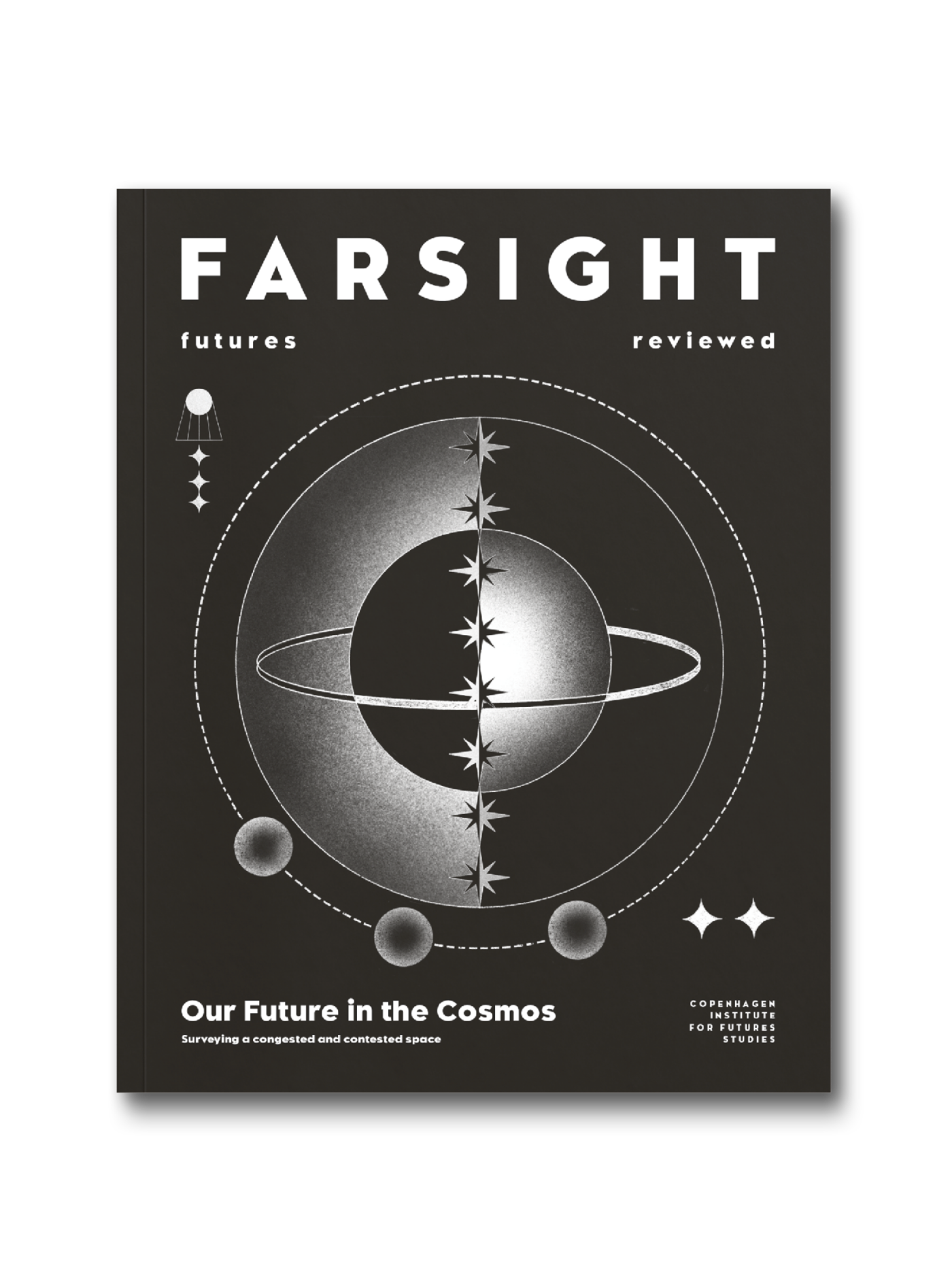
In turn, we use cookies to measure and obtain statistical data about the navigation of the users. You can configure and accept the use of the cookies, and modify your consent options, at any time.

Europe in Space
An interview with Hermann Ludwig Muller, Chairman of the European Space Policy Institute
Photo: ESA
It’s a diverse crowd pouring coffees and eating apple strudels in Vienna’s Urania Observatory before the European Space Policy Institute’s (ESPI) 17th Autumn Conference kicks off. Amid the chatter of attendees, a former French Minister of Education, a former Deputy Prime Minister of Luxembourg, and the Chief Economist of NASA can be spotted discussing Europe’s future in space – the event’s agenda. Representatives from the various European space agencies as well as delegates from the Indian Space Research Organisation (ISRO), which recently put the country on the map as the fourth nation to make a soft landing on the Moon’s surface, can be seen chatting on the observatory’s balcony as well. The 360-degree scaling view it offers is symbolic of the event’s clout: a sharp-eyed gaze can make out the UN Office for Outer Space Affairs to the East, Austrian Space Agency to the West, and ESPI’s building to the South.
Thus, anticipations of a conference filled with sci-fi reciting space-geeks are quickly dispelled. Instead, it’s a foyer filled with navy blazers, business-related chatter, and the interspersed sounds of Microsoft Teams pings. That is, if you exclude the dapper attire of Hermann Ludwig Moeller, donning a blue-gray checkered suit with a mint green tie. Since assuming the role of ESPI’s Director in the Summer of 2022, he has been emerging as one of Europe’s foremost advocates of transforming the continent into an independent and leading space power by 2040.

Broaden your horizons with a Futures Membership. Stay updated on key trends and developments through receiving quarterly issues of FARSIGHT, live Futures Seminars with futurists, training, and discounts on our courses.
become a futures memberThis won’t be an easy task. Catalysed by Russia’s invasion of Ukraine and signs of increasing political isolationism in the United States, European leaders are only now realising that ensuring the region’s resilience has become a geopolitical necessity requiring swift action. And this independence applies not only to areas relating to critical infrastructure, security, and defence, but those that have to do with Europe’s soft power on an international stage, too.
Space – it turns out – is exactly such a domain. And although it’s easy to get lost in the media frenzy of Elon Musk wanting to settle Mars or American officials testifying on UFO sightings, modern (and especially digital) life is already incredibly dependent on the space industry. Consider how navigation technologies, which are entirely dependent on an intricate web of satellites and service stations scattered above the Earth’s atmosphere, are used on a day-to-day basis. Or how many industries rely on accurate Earth Observation abilities, such as meteorology, traffic management, disaster relief, and military intelligence. “I consider space to be all pervasive: it will penetrate our lives more than we can even imagine today,” Moeller opens our interview by saying.
The Institute’s Director begins his survey of European space ambitions by reminding me that activities in space can often be precursors to a change in relations between countries down on Earth. “Although Europe was once a shaping force on the planet, you could argue that today it is often a junior partner and has a strong dependability on the US. In this sense, space is sometimes an early indicator of shifts in policies and spheres of influence on the international stage. For example, consider the collaborations in space prior to the end of the Cold War and likewise, look now at the deorbiting of the International Space Station (ISS) reflecting a more polarised world order down below.”
Indeed, the ISS, which began its journey in 1998 in front of a Fukuyaman post-historical landscape, will be officially retired in 2031; in this same decade, the United States, China, Russia, and India all aim to have a presence on the Moon. Europe, on the other hand, has been squeezed out of the equation and left as a second-rate aspiring space actor – at least in comparison to the grand visions and actions of others. So why is it that the United States, a country sharing many of the same values as Europe, is so far ahead when it comes to something like space?
There are multiple reasons – but at its core, Moeller attributes it to a lack of political will in Europe and a greater embrace of risk and uncertainty in American society. “In the US, there’s a higher degree of openness to new frontiers. I mean, it is a country of new frontiers,” he says. “There’s a certain spirit in the people to which space deeply resonates. Now of course, you still have to create that resonance somehow – and the Apollo 11 Moon landing was certainly the moment when that happened.”
This resonance has also been actively maintained since 1969 to the point where you have “multiple citizens’ assemblies knocking on Capitol Hill demanding ‘a Moon landing, dammit!’,” as NASA’s Chief Economist eloquently put it during a panel debate. Moeller tells a story of how when working at NASA in Washington DC during the Mars Rover landing in 1997, he couldn’t help but notice the symbolism of the date being on the 4th of July. “A nation deciding to land a mission on its national holiday says a lot about the role of space in that society.” The American space ecosystem is truly all-encompassing, stretching from NASA’s Space Camps for kids to Hollywood blockbusters. It’s these catalysing effects that have allowed the American space industry to become the positive feedback loop that continues expanding even 54 years after the Apollo 11 landing. And to an extent, it’s because of this cosmic elevation in American public consciousness that the United States can proportionally invest much more money in the industry than Europe does. US investors recognise how by catalysing growth in the space industry, they create wave (not ripple) effects in the greater economy. As of 2023, the share of space investments in the United States lies at 0.25% of GDP, whereas Europe’s lies at 0.075%. “It’s evident that if we stay within this ratio,” Moeller says, “we will not be able to even maintain what we have today, and we stand to risk losing our position in space.”
Sized up against the gargantuan budget and state apparatus of the US, Europe’s future in space might seem forlorn. But that hasn’t stopped Moeller and ESPI from proposing some incredibly ambitious goals. One figure stands out: by 2040, Europe will have realised the full potential of space and have captured 25% of estimated global value of space for the broader economy.
“Just for comparison, 25% of global wealth was held by Europe until just a few years ago,” Moeller reminds me. “I believe that right now, Europe has everything it needs to be competitive with the US in terms of talent, people, and capabilities. But to reach any of the goals, the share of space investments needs to get up to 0.15% of Europe’s GDP – a doubling of what Europe invests today.”
For while Europe may not be a space power today, it is a global leader within certain fields. Take Earth Observation for example. The EU-led Copernicus programme, a collection of over 30 satellites tasked with retrieving state-of-the art data is a publicly available resource and the number one provider of space data and information in the world.
Europe is also poised to become the global leader in space law, as evidenced by a recent initiative proposing an EU Space Law that could be adopted by the Commission as soon as the first quarter of 2024. This would make the Union the first internationally governing body to regulate space, focusing particularly on the areas of space debris management, protecting space infrastructures, and guaranteeing the long-term sustainability of the EU’s space operations. And, of course, Europe is incredibly well-positioned in terms of talent, being home to some of the world’s most prestigious universities and space programmes.

Explore the world of tomorrow with handpicked articles by signing up to our monthly newsletter.
sign up hereIn the end, however, Europe simply lacks the necessary upfront investment to kickstart its nascent journey as a space power. It took the US Department of Defence spending billions of dollars on the Apollo 11 programme in order for space to reach the cultural significance it has in that country today – an initial (albeit ideological) willingness to invest in space capabilities had to be there first.
So how can European stakeholders be convinced of the value of space?
“I think we need to open up and brace for a culture change in Europe, to embrace not only risk but also readiness – political will. We need to be future-oriented, and I think that in many domains we are not anymore, especially within technology,” Moeller stresses.
The willingness of the Americans to embrace risk in a long-term manner is another point that is repeated during the conference. For this culture-change to occur, the potential size of the space economy has to be emphasised, as must Europe’s risk of becoming merely a junior partner in space similar to its current role in the global tech landscape, Moeller believes.
Regarding size, the numbers can be enormous: according to a November 2023 report co-authored by ESPI and BCG, the European space economy could potentially be valued at €1tn by 2040. And this figure may even be a conservative estimate, Moeller says:
“When you talk about the overall benefit of space in the wider economy the number is larger than that, because you need to look at how space supports the development of various other industries,” he explains, pointing to its value for smart cities, energy transition, agriculture, weather forecasting, as well as health and education. Making a comparison to the semiconductor industry, he says that “in the case of such transformative technologies, you tend to find economic multipliers in the range of around seven. So, you could argue that ultimately, we are talking about an impact of space on the wider economy that is in a potential range of €7tn by 2040.”
Moeller underlines that these numbers need “more maturity”, but the overall point is clear: the economic gains do not stop at the direct benefit of space for the space economy – instead, they emphasise the vital role of space in the economy.
Similarly, for space industry pressure groups, ‘space’ is something intrinsically tied to what happens on Earth, and not the territory of cosmic sci-fi stories. Of course, desires of settling Mars, mining asteroids, and venturing deep into the cosmos puts pressure on the entire space ecosystem to expand – but when envisioning Europe as a 2040 space power, it isn’t something atmospherically adrift from the issues we have on Earth.
Indeed, a question often directed at the space-obsessed is this: what is the point of space? Faced with existential risks such as climate change, unregulated artificial intelligence running amok, and regional wars flaring up to engulf the globe, shouldn’t our view turn inwards rather than outwards? The question isn’t new to organisations such as ESPI, who tend to stress the positive impact a presence in space can make on Earth.
“I think it’s incredibly important to bring across a message that many services in space, such as Earth Observation data, can actually help the planet battle existential risks such as climate change,” Moeller says. According to one study, the potential amount of annual energy output produced by space based solar power could be upwards of 800TWh by 2050 (for comparison, Germany’s annual electricity consumption lies at around 501TWh – the largest in Europe).
Towards the end of our conversation, I mention the discrepancy between my expectations of who might be attending the conference with the blend of participants actually present there, many of whom were venture capitalists, government innovation agencies, industry representatives, and actors from the security & defence sector. This, to me, conjured images more akin to the military-industrial- complex than to a gathering of unassuming space-geeks.
But perhaps failing to see the interdependency of the different parts of the space industry, including the crucial role of defence, was a fault of my own. Point to any groundbreaking technology from the 20th century and you will probably find its initial R&D source in the Pentagon. Those that wish to see space used solely for peaceful purposes may have to come to terms with this fact, Moeller says:
“The claim that space is irrelevant until we solve climate change assumes that you can slice space into neat little pieces and pursue doing what you think is your own priority, such as Earth Observation in Europe’s case. And having worked on the Copernicus programme for over 10 years, I’ve come to realise that at the end of the day, it’s all the same industrial base. To be successful you need to address the sector as a whole,” he says.
Moeller stresses the importance of achieving a ‘critical mass’, the point at which the European space-industry becomes self-sustaining with an internal European market and no longer reliant on outside investment to be economically viable. He explains that there are two sectors of every current space power that tend to carry the cross-collaborative strategy needed to reach a critical mass: Security & Defence and Space Exploration.
SpaceX is often used as an example of how large upfront investment is required to allow a company to diversify its capabilities. “SpaceX didn’t start without any public funding – they began with contracts from NASA for the transportation of crew and cargo to space stations for a volume of over $4bn in total,” says Moeller.
“And at some point, this enabled Elon Musk to develop the Falcon 9 rocket. After it was demonstrated that it could actually land and be reused, investments came in. Google, for example, invested $1bn. Shortly after this, Musk announced the Starlink service,” Moeller explains.
“You needed the narrative that there was a large public upfront investment for exploration reasons to breach into a new field of space. And that’s a perfect example of the interdependency of the different parts of the industry. If you start siloing pieces of that industry, then you run the risk of losing its critical mass.”
This isn’t to say that European ambitions of becoming an independent and leading space power should be guided by the same values that can be found in the United States (or China, Russia, and India for that matter). A key theme of the conference is the need for Europe to frame its space ambitions in a way that helps strengthen the European project itself. Moeller is also firm in stating that an independent Europe is not necessarily an isolated one.
“What we are advocating for is a strong Europe as a partner to the world,” he stresses, citing the United States’ Artemis accords as a “perfect example of something that is not just a space programme,” but also a way of creating a framework open to others which nonetheless gives the initiator a certain level of global and diplomatic influence.
An influence, it could be argued, that has been waning in Europe for decades. Perhaps it’s about time for another region to ascend, one might be thinking – one that Europe has previously exploited to become a leading power in the first place. To Moeller, it is precisely the idea of Europe as a global partner that could enable much of the developing world and emerging space powers to join forces and tap into space.
“If you want to maintain your [European] values in a world where they’re being debated among world-leading powers, you have a vested interest in securing a seat at that table. But you will only sit there if you have your own capability and power,” he says.
“Let’s project this onto space exploration – to what the rules will be when sharing the Moon. If you’re not even on the Moon, then I don’t think you’ll be part of that discussion. I can assure you that the others – be they China, India, or the US – will respond with a resolute ‘Who are you?’,” says Moeller. “If you want to defend your values, if you want a better world, a better Universe, then you need to be present and invest in that capability.”
Taking the train back to Vienna Airport, I reflect on how my initial notion of Europe’s future in space being led by eccentric space-nerds reciting cosmonaut sci-fi has been replaced with not just pragmatic policymakers – but also the continent’s youth. The average age at ESPI is 28 years old with a gender balance nearing 50:50. For comparison, the average age of the engineers inside Apollo 11’s Mission Control was also 28 years old (with only one woman present). If anything pushes Europe into the forefront of the new space race, then perhaps it’s the diversity of its youth who aren’t, as Moeller says, “so naïve as to think that space is suddenly a different ‘space’,” from that on Earth. “Space is exposed to the same influence of humankind as on Earth,” he says. His hope is that the youth will be more mindful of this fact and adamant in upholding values of prosperity and peace, as well as what is best for future generations. “They are looking for a purpose in space,” he says. “And in that sense, they will be critical.”

This is an article from FARSIGHT:
Our Future in the Cosmos
Grab a copy here